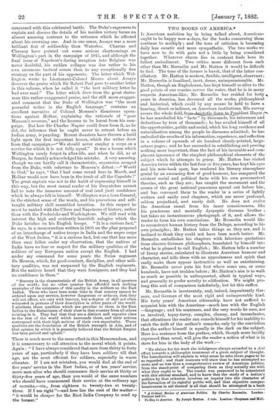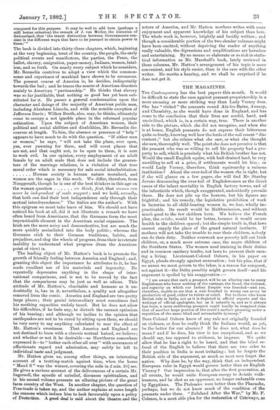TWO BOOKS ON AMERICA.*
IF American ambition lay in being talked about, Americans ought to be happy now-a-days, for the books concerning them continue to multiply ; and the tone of criticism is becon3ing
daily less caustic and more sympathetic. The two works we have now to do with gain not a little by being considered together. Whatever charm lies in contrast finds here its fullest embodiment. Two critics more different from each other than Mr. Reemelin and Mr. Hatton it would be difficult to find. The tone of the former is harsh, that of the latter con- ciliatory. Mr. Hatton is modern, flexible, intelligent, observant; Mr. Reemelin is fossilised, inert, dense, unimpressionable. Mr. Hatton, though an Englishman, has kept himself so alive to the good points of our cousins across the water, that he is in many respects American-like; Mr. Reemelin has resided for forty years in America, has devoured all the works, philosophical and historical, which could by any means be held to have a bearing, direct or indirect, on American institutions. His survey
covers the whole field, from–kistotle demi to President Hayes ;`■ he has marshalled his " facts " by thousands, his inferences and
deductions by tens of thousands ; he has availed himself of all the opportunities, public and social, which his long residence and naturalisation among the people he discusses admitted ; he has embodied the results of his information, experience, and reflection in a volume of upwards of six hundred closely-printed, large- octavo pages ; and he has succeeded in establishing and proving nothing more important, than the fact of his incurable and com- placent ignorance of the simplest philosophical elements of the subject which he attempts to grasp. Mr. Hatton has visited America twice within the last four or five years, has kept his eyes and his note-book open, has rendered his literary atmosphere genial by an unceasing flow of good-humour, has compared the existent social and political facts with his own preconceived theories, such as they are ; has caught the movement and the aroma of the great national panorama spread out before him, and has conveyed them to the reader in a series of lightly written and easily read chapters, which are never profound, seldom prejudiced, and rarely dull. He does not evolve the American camel from his inner consciousness, like his ponderous and mentally dyspeptic German brother ; but takes an instantaneous photograph of it, and allows the reader to form his own conclusions. Mr. Reemelin would like to reconstruct human history from the Deluge, according to his own principles ; Mr. Hatton takes things as they are, and is inclined to think they could not have been much better. Mr. Reemelin embellishes his chapters with laborious quotations from obscure German philosophers, translated by himself into what he is pleased to call English ; Mr. Hatton tells a number of funny stories, calculated to illustrate American humour and character, and tells them with an appositeness and spirit that really make them appear instructive as well as entertaining. Mr. Reemelin never puts his foot where some one, or some hundreds, have not trodden before ; Mr. Rattan's aim is to walk as much as possible in unfrequented, albeit in typical ways, and generally to prefer novelty to edification. We might pro- long this sort of comparison indefinitely, but let this suffice.
Mr. Reemelin is inveterately, and, indeed, impenitently Ger- man, and German of the most rigid and unimprovable kind. His forty years' American citizenship have not sufficed to acquaint him with the American—much less with the English —language ; and his sentences, and the very words he uses, are so involved, topsy-turvy, complex, clumsy, and inconclusive, that oftentimes the reader can console himself for his inability to catch the drift of the author's remarks, only by the conviction that the author himself is equally in the dark on the subject. Here is a sentence from the preface, which, though more lucidly expressed than usual, will give the reader a notion of what is in store for him in the body of the work :—
" He claims for his work tho indulgence always accorded to a first effort towards a philosophic treatment of a given subject of thought. The Introduction will explain in what sense he asks these pages to be so regarded ; and their contents will show that he has attempted no more and no less than a comprehensive review of American politics, from the stand-point of comparing them as they actually are with what they ought to be. The reader was presumed to be acquainted with this ethical standard, and to know that the study of a nation's politics by that criterion involves an inquiry into the character of the formation of its rightful public will, and that objective compre- hensiveness in aid thereof is all that should be attempted in a book • A Critical Review. of American Politics. By Charles Reemelin. London Trabner and Co. To-Day in America. By Joseph Hatton. 2 vols. London: Chapman and Hall. composed for this purpose. It may be well to add here (perhaps a still better criterion) the remark of J. von Muller, the historian of Switzerland, that the truest distinction between Governments con- sists in the different ways that have to be pursued to obtain power in them.'"
The book is divided into thirty-three chapters, which, beginning at the very beginning, treat of the country, the people, the early political events and manifestoes, the parties, the Press, the ballot, slavery, emigration, paper-money, Indians, women, fatal- ism, and so forth. On nearly every subject which he considers, Mr. Reemelin contrives to adopt a view which the common- sense and experience of mankind have shown to be erroneous. The present coarse of America is, he decides, indisputably towards the bad ; and he traces the source of American disasters mainly to American "partisanship." He thinks that slavery was so far justifiable, that nothing so good. has yet been sub- stituted for it. He passes a general condemnation upon the character and doings of the majority of American public men, including Abraham Lincoln, and with the notable exception of Jefferson Davis ; Wilkes Booth, also, may, he thinks, ultimately come to occupy a not ignoble place in the reformed popular estimation. Upon the subject of American women, their political and social abilities and disabilities, Mr. Reemelin dis- courses at length. To him, the absence or presence of " help " appears to have much to do with the question. "If either men or women," he says, "will not take the place, ever open, yea, ever yawning for them, and will covet places that are not, and that ought not, to be open to them, it is sure to work evil. In our opinion, every employment of an adult female by an adult male that does not include the guaran- tees of the marriage relations, is a violation of that true moral order which is necessary for safe social interhabitation.
Human society is human nature moralised, and women are the sages in this work. We differ, therefore, from Noeggerath, though he is one of the best thinkers in this age on the woman question we think, first, that women can never be independent of male support; and we hold, secondly, that both can find their best independence only through their mutual interdependence." The italics are the author's. With this epigram we must take leave of him. We should not have noticed his book at all, did it not illustrate a remark we have often heard from Americans, that the Germans form the most impracticable element in the American social organism. The Irish are the more noisy and demonstrative, but are much the more quickly assimilated into the body politic; whereas the Germans stick to their German traditions, habits, and prejudices, and clog the wheels of progress, from their inveterate inability to understand what progress (from the American point of view) is.
The leading object of Mr. Hatton's book is to promote the growth of friendly feeling between America and England ; and, granting this object the importance he attributes to it, he has made excellent use of his materials and ingenuity. He repeatedly deprecates anything in the shape of inter- national comparisons, and is not to be moved by the fact that the comparisons may be just as well as odious. This attitude of Mr. Hatton's, charitable and humane as it un- doubtedly is, has in it, nevertheless, a quality not altogether removed from the comic. America and England are two pretty large places ; their genial intermediary mast sometimes find his soothing capacities unduly taxed. But he does not allow his difficulties, if he feels any, to disturb the earnest optimism of his bearing; and although we incline to the opinion that earthquakes are not to be cured by sitting upon them, we should be very sorry to say anything calculated to mar the effect of Mr. Hatton's sweetness. That America and England are not destined to burn with a chronic mutual hatred, we believe; and whether or not it be desirable—as Hawthorne somewhere expressed it—to" butter each other all over" with assurances of affectionate regard and admiration, may safely be left to individual taste and judgment.
Mr. Hatton gives us, among other things, an interesting account of a trotting-match against time, when the horse "Maud S" was the winner, covering the mile in 2 min. 101see. He gives a curious account of the deliverances of a certain Mr. Ingersoll, the apostle of unbelief, discusses spiritualism, and in his second volume presents an alluring picture of the great farm country of the West. In another chapter, the question of Free-trade is taken up, and the author explains at some length the reasons which induce him to look favourably upon a policy of Protection. A good deal is said. about the theatre and the actors of America, and Mr. Hatton nowhere writes with more enjoyment and apparent knowledge of his subject than here. The whole work is, however, brightly and lucidly written ; and though a considerable portion of the two slender volumes might have been omitted, without depriving the reader of anything really valuable, the digressions and amplifications are harmless and entertaining. By no means so elaborate or so rich in statis- tical information as Mr. Marshall's book, lately reviewed in these columns, Mr. Hatton's arrangement of his topic is more convenient, and his style easier, than is the case with the other writer. He merits a hearing, and we shall be surprised if he does not get it.















































 Previous page
Previous page